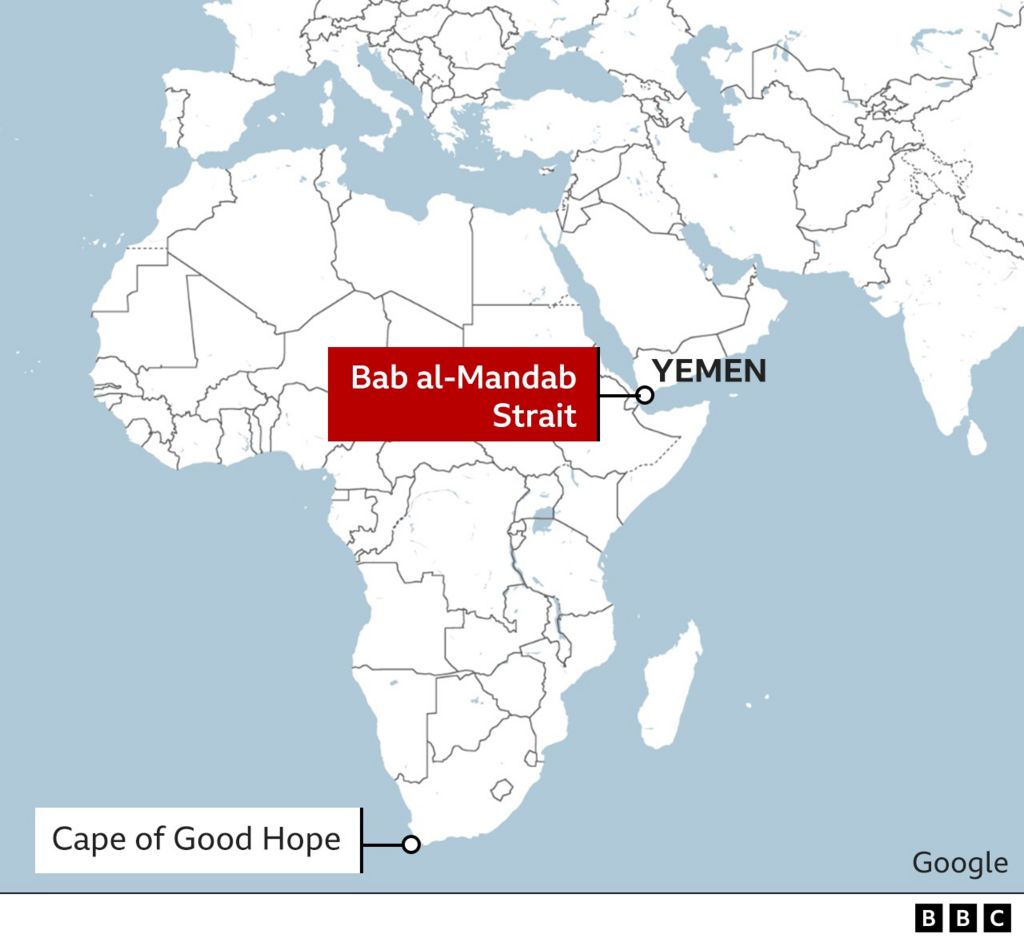-

-
-
Loading

Loading

The diversion of shipping routes away from the Red Sea is causing significant disruptions to global supply chains. This redirection is happening as a result of attacks by Houthi rebels in Yemen on commercial vessels, leading many shipping companies to avoid one of the busiest shipping lanes in the world. While the Houthi group has declared support for Hamas and claims to target ships heading to Israel, it is uncertain if all the attacked ships were actually bound for Israel. The group has been increasing its attacks since the start of the Israel-Hamas conflict in October, using drones and rockets to target foreign-owned vessels transporting goods through the strait of Bab al-Mandab. This strait is a narrow channel that separates Eritrea and Djibouti on the African side from Yemen on the Arabian Peninsula. The usual route for ships is from the south to reach Egypt's Suez Canal further north. However, due to the attacks and the potential for future ones, major shipping firms like Mediterranean Shipping Company and Maersk have decided to divert vessels on a much longer route around Africa's Cape of Good Hope and then up the west side of the continent. BP has also halted all oil shipments through the Red Sea due to the deteriorating security situation. These longer journeys will add up to 10 days to shipping times and result in substantial financial costs for companies. As the Suez Canal is the fastest sea route between Asia and Europe and plays a critical role in the transportation of oil and liquefied natural gas, the disruption to supply chains is expected to have a significant impact. Approximately 17,000 ships and 10-12% of global trade pass through the strait of Bab al-Mandab and the Red Sea each year. Analysts suggest that nearly 15% of goods imported into Europe, the Middle East, and North Africa are shipped from Asia and the Gulf via sea, including a substantial amount of oil. Container ships also carry various consumer goods, such as electronics, clothing, and sports equipment. The diversion of ships away from the Red Sea is likely to affect supply chains, with consumer goods facing the most significant impact. The off-peak shipping season has observed the current disruptions, but delays in product availability are anticipated. Container ship journeys are expected to take an additional 10 days due to the Cape of Good Hope route, adding around 3,500 nautical miles. This extra distance will also result in higher costs for companies. Although shipping rates have increased by 4% in the past week, they remain lower than last year when freight charges soared due to increased demand after Covid restrictions were eased. The disruptions are also causing concerns about potential increases in oil prices, which can have repercussions for fuel and inflation. The UK's inflation rate stands at 4.6%. Chris Rogers, head of supply chain research at S&P Global Market Intelligence, notes that transporting goods by rail would require crossing Russia, which is under economic sanctions due to its invasion of Ukraine. Trucking from the Gulf to Israel would only offset a small percentage of shipping. In response to the attacks, the US has initiated an international naval operation to protect ships in the Red Sea route, with several countries joining, including the UK, Canada, France, Bahrain, Norway, and Spain. US defense secretary Lloyd Austin has called for more nations to contribute to efforts to ensure safe shipping in the region.